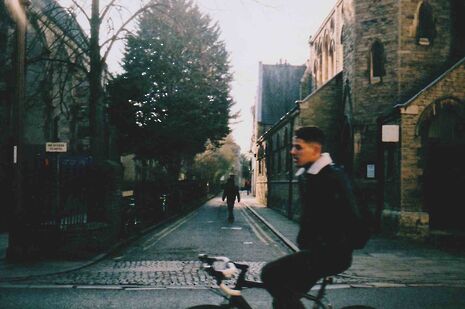On the merits of walking (or, why I violently do not want to ride my bicycle)
Walking truly allows you to take in, and appreciate, your surroundings, says Izzy Dignum

Two weeks ago, I rode a bicycle for the first time in ten years, largely for the sake of this column. I was planning to regale you with tales of how I rode into a car, or fell headlong into the Cam, or got myself tangled up with a hawthorn and a herd of cows, but unfortunately none of those things happened. But it wasn’t until I moved from two wheels to two feet that I realised how much I didn’t like cycling.
Perhaps that isn’t the best way of describing it; I appreciate cycling for the wind in my hair and the sweat under my helmet and the satisfying feeling of dinging at tourists, but it is not my preferred method of transport.
When I am running or cycling or doing anything over the speed of four miles an hour my attention switches to my sweaty headphones or my steering wheel or the possibility of being hit by a car. This is not detail. It is stress or panic and far from my ‘poetic’ ideal of a nature walk. I find it very difficult to hold more than one thing in my brain at once, juggling not with balls or fire sticks (although that is what Cambridge sometimes feels like) but with glimpses of colour and rustles in hedgerows and trying to hold the sensation of being alive. It’s in the sensation of movement, of one foot in front of the other, seemingly slow progress but at least I have the time to notice things, work things out other than ‘can I run back home before I collapse and die’. Walking gives me the opportunity to engage the conscious part of my brain that lies dormant for too long, that shakes cold into my fingertips and droplets of rain into my hair. I feel alive in ways that the fast motion of cycling and running cannot grant me.
Take birds: I know a lot of birds by sight, but one of my favourite practices is seeing if I can identify the bird by its call. You cannot hear birdsong over the clattering of bicycle wheels or Spotify’s ‘Fast Pop Run: 180 bpm’ playlist.
An example of Things Noticed, from a night when I needed to leave the bubble, clear my head, see grass that I could walk on: It wasn’t the most pleasant night to do so (chilly, spitting with rain, a gauze-like night falling rapidly), and everyone I encountered was either running or cycling. Understandably so, because it was cold and damp and there would be dinners and dogs and families waiting. Walking through suburbs, I was struck by the dense cosiness of it all; warm living room lights and laid dining room tables and television sets, house-to-house depictions of domesticity which made me consider what sort of ‘home’ Cambridge is for me.
Outside, however, was quite the opposite, an opaqueness collecting which blurred the edges of trees. I, in contrast, was unsettled at first, because I spent far too many hours this summer watching Midsomer Murders and therefore know a wide variety of ways in which one can be slaughtered at dusk. But as darkness settled so did I, happy to pause and stare without fears of being clobbered with a branch.
Then –
bats!
as typed in a furious text, because the last time I saw bats was at Cotswold Wildlife Park, whose bat house I refused to enter for the first eight years of my life because I was scared of the dark. I am no longer scared of the dark, and I was rooted for an unknown amount of time, watching first one then more swoop over the Cam, above the treetops, arcing and diving and I was filled with the indescribable joy of simply noticing. I know nothing ‘proper’ about bats beyond the Year 10 Physics lesson about sonar, but this was mesmerising, and although the sightings increasingly became simply dark shapes against more dark shapes, I felt that this was an experience for me alone. I noticed many things that evening (a light aircraft that for a split-second I thought was a heron flying at high altitude, what was potentially a wagtail), but the cauldron of bats was transfixing in the best way. ‘Cauldron’ is the best possible collective noun for a group of bats; dark, belonging to the night, to mystery, and most importantly, evoking magic.
If I had been cycling, I would not have been looking at the sky. Maybe now (or dawn, or dusk) is the time to look up, look out, shift your perspective, be that traversing the world on two feet or two wheels. In her poem ‘Of Mutability’, Jo Shapcott writes ““Look up to catch eclipses, gold leaf, comets, / angels, chandeliers, out of the corner of your eye””. Although these caught glimpses are fleeting, momentary, a snatched blackbird song or sweeping bat wing arc, memories last far longer.
 News / Judge Business School advisor resigns over Epstein and Andrew links18 February 2026
News / Judge Business School advisor resigns over Epstein and Andrew links18 February 2026 News / Hundreds of Cambridge academics demand vote on fate of vet course20 February 2026
News / Hundreds of Cambridge academics demand vote on fate of vet course20 February 2026 News / Petition demands University reverse decision on vegan menu20 February 2026
News / Petition demands University reverse decision on vegan menu20 February 2026 News / CUCA members attend Reform rally in London20 February 2026
News / CUCA members attend Reform rally in London20 February 2026 News / Gov grants £36m to Cambridge supercomputer17 February 2026
News / Gov grants £36m to Cambridge supercomputer17 February 2026










